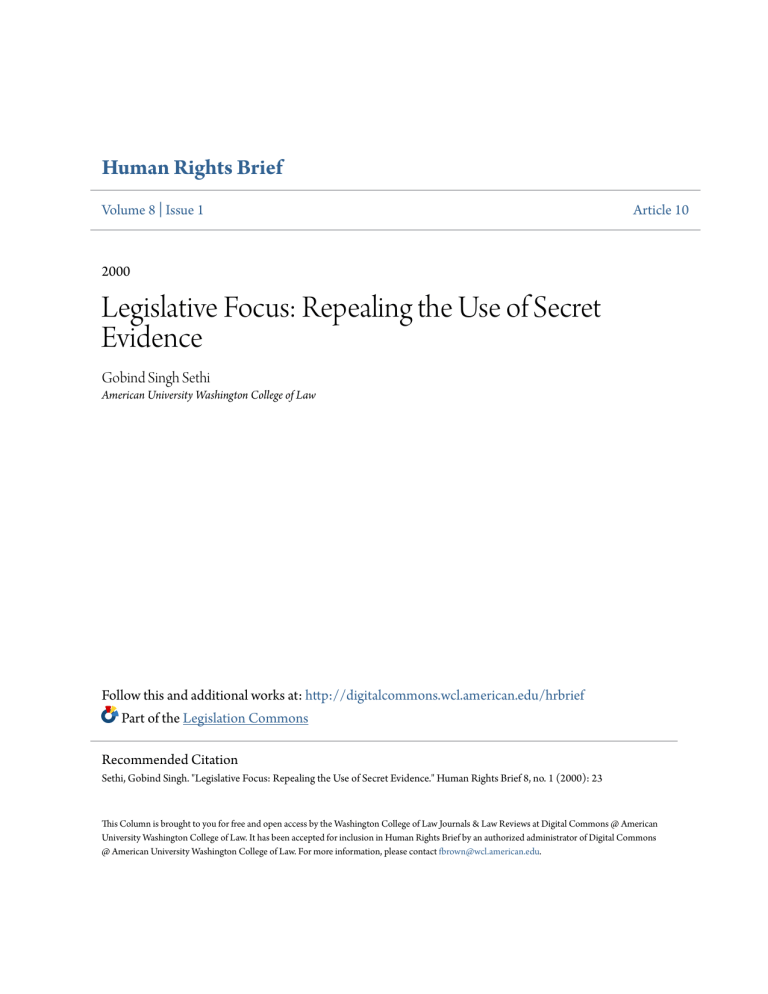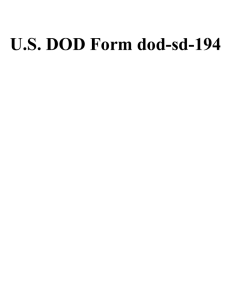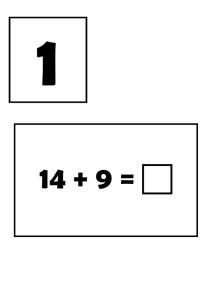Legislative Focus: Repealing the Use of Secret Evidence

Human Rights Brief
Volume 8 | Issue 1
2000
Legislative Focus: Repealing the Use of Secret
Evidence
Gobind Singh Sethi
American University Washington College of Law
Article 10
Follow this and additional works at: http://digitalcommons.wcl.american.edu/hrbrief
Part of the Legislation Commons
Recommended Citation
Sethi, Gobind Singh. "Legislative Focus: Repealing the Use of Secret Evidence." Human Rights Brief 8, no. 1 (2000): 23
This Column is brought to you for free and open access by the Washington College of Law Journals & Law Reviews at Digital Commons @ American
University Washington College of Law. It has been accepted for inclusion in Human Rights Brief by an authorized administrator of Digital Commons
@ American University Washington College of Law. For more information, please contact fbrown@wcl.american.edu
.
Sethi: Legislative Focus: Repealing the Use of Secret Evidence
I n 1996, Congress enacted the Illegal Immigration Reform and Immigrant Responsibility Act (IIRAIRA), which authorized the Immigration and Naturalization Service (INS) to use secret evidence against aliens in various immigration proceedings. H.R. 2121, the Secret Evidence Repeal Act (SERA
1999), was introduced in 1999 and reintroduced to Congress in
2000 (SERA 2000). SERA 2000, if enacted, would help restore to aliens some of the constitutionally mandated procedural safeguards guaranteed to U.S. citizens that IIRAIRA removed.
In particular, SERA 2000 prohibits the use of secret evidence in removal and asylum proceedings, as well as bond and immigration benefit hearings, with the exception of cases where aliens are removable for terrorist activities.
Presently, the INS uses secret evidence by presenting the evidence before a judge, without the alien or her attorney present.
In order for the INS to use secret evidence, two criteria must be satisfied: a government agency, such as the Federal Bureau of
Investigation, must deem the evidence classified; and the INS must find the evidence to be relevant to the case.
Many critics have challenged the constitutionality of secret evidence, arguing it is contrary to Fifth Amendment procedural due process guarantees. In secret evidence cases, the accused is unable to adequately refute the secret evidence used against her because of restrictions denying access or knowledge of the evidence. IIRAIRA also prohibits the accused from confronting and cross-examining the witness that informed the authorities of the relevant evidence. Thus, there is no way for the accused to question the credibility of the witness. Moreover, the use of secret evidence diminishes the prospects of a successful appeal because the accused cannot challenge rulings on evidentiary grounds. Due to the gross procedural abuses resulting from secret evidence, all federal courts, including the Supreme Court, have consistently banned its use.
Recent cases involving the use of secret evidence have questioned its constitutionality, and have signaled to lawmakers the need to repeal its use. In Kiareldeen v. Reno, the INS detained
Hany Kiareldeen, a Palestinian, for 19 months pending his removal based on secret evidence. The INS arrested Kiareldeen on March 27, 1998. The only formal charge the INS raised against Kiareldeen was that he failed to maintain his student visa status and was thus deportable. Based on secret evidence, however, the immigration judge initially handling his case denied his bond request on the grounds that Kiareldeen posed a threat to national security.
Kiareldeen appealed the immigration judge decision to the
Board of Immigration Appeals (BIA) and filed a habeas corpus petition with a federal district court in New Jersey. Both courts permitted Kiareldeen to receive summaries of the secret evidence used by the INS in the initial bond hearing. According to the
BIA, Kiareldeen’s rebuttal clearly demonstrated he was not a threat to national security, and therefore ordered his release.
In fact, the evidence was discovered to be uncorroborated hearsay alleged by his ex-wife. The district court concluded the use of secret evidence violated Kiareldeen’s due process rights and ordered his release on that basis. Both judicial bodies criticized the INS for its inappropriate use of secret evidence to detain Kiareldeen for 19 months.
Legislative History and Substance of H.R. 2121
The Kiareldeen decision, along with others, spurred members of the House of Representatives to enact legislation reforming
legislative focus
Repealing the Use of Secret Evidence
By Gobind Singh Sethi* the use of secret evidence against aliens. On June 10, 1999, Congressman David Bonior (D-MI) introduced the Secret Evidence
Repeal Act of 1999. Originally SERA 1999 would have repealed all use of secret evidence in immigration cases. After a September
26, 2000, House Judiciary Committee mark-up, however, SERA
2000 as amended still permits the use of secret evidence, but restricts it to removal proceedings where the alien is alleged to be deportable under section 237(a)(4)(B) of the Immigration and Naturalization Act. This section applies to any alien “who has engaged in, is engaged, or at admission engages in any terrorist activity.”
SERA 2000 requires the Attorney General to inform the accused and the presiding immigration judge of the INS’s intention to use secret evidence. The INS must provide the accused with a summary of the evidence and also refer the evidence to a federal district court. The federal judge must examine the summary to determine whether the summary would permit the defendant substantially the same defense as the secret evidence, in its entirety, would have provided. If the summary is deemed sufficient, the immigration judge hearing the case would receive only the same summarized information as the accused.
SERA 2000 would restore due process rights to a fair hearing for most aliens in immigration proceedings concerning secret evidence. Only known terrorists would be deprived from their liberty based on the use of secret evidence. Aliens would then be able to adequately defend themselves in court, while still allowing the government to keep classified information secret.
On October 17, 2000, SERA 2000 was placed on the Union Calendar in the House of Representatives.
*Gobind Singh Sethi is a J.D. candidate at the Washington College of
Law and an articles editor for the Human Rights Brief.
Order your subscription to the
Human Rights Brief
NAME
_____________________________________
INSTITUTION
_______________________________
ADDRESS
__________________________________
CITY
_______________
STATE
______
ZIP
_______
AMOUNT ENCLOSED
_________________________
Subscription rate $27.50/year
Please make check or money order payable to the Center for
Human Rights and Humanitarian Law and send to:
American University
Center for Human Rights and Humanitarian Law
Washington College of Law
4801 Massachusetts Avenue, NW, Suite 630
Washington, DC 20016–8181
Published by Digital Commons @ American University Washington College of Law, 2000
23
1




